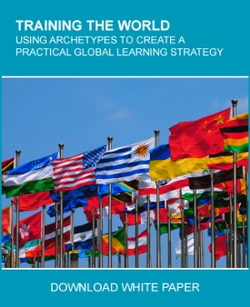This is the third in a series of conversations with PDG Managing Partner David Manning where he shares his perspectives on emerging top trends in the business of learning. In this installment, David shares his observations on the trend of globalization.
Q: What is a recent trend you have experienced in the learning field?
DM: Most of the clients we work with are large, global organizations. Many of these organizations are focused on optimizing their programs for delivery on a global scale. But very few organizations are globalizing their learning capability effectively. Global organizations need to have a way of rapidly creating and deploying content on a global scale.
Q: What are some of the challenges of implementing global learning?
DM: It can take a huge number of resources to create content for global learning, especially if you are a large organization with hundreds of thousands of employees worldwide. You need to understand the nuances of each local market and know how best to deliver learning to that specific audience.
Organizations need to deliver learning on a global scale in a way that is cost effective, timely, and relevant to each local market. Many organizations are struggling with where to start and how to execute their plans. I think there will be a greater need for more organizations to deliver global learning, as even small organizations now are operating on a global scale.
Q: What do you think has changed in the marketplace to make these trends necessary?
DM: Globalization isn’t a new issue, just one that continues to be a challenge. Years ago, US-based organizations would create learning programs in the US and send them to multiple countries where they would be translated and delivered to the local staff. There was never a global view of what needed to be done, how things needed to be structured, and how the learning program needed to be delivered. Each region would localize the learning; it wasn’t very organized, and many times the content wasn’t relevant to local markets. They lacked a plan.
Eventually, organizations started bringing a more global perspective into how learning had to be created, and set up. But they struggled in the execution of global learning. Many of their learning and development staff did not have the correct skills to run a global function, or they didn’t have the resources to do it. They also didn’t have an overarching strategy to accomplish fully the globalization of learning, other than doing a better job of distributing content and making it relevant.
Currently, learning and development is viewed as a global capability. Companies are starting to develop global learning strategies that allow them to align content rapidly with global business needs. Their plans include the global creation and distribution of content as well as maintenance and assessment of the impact. A number of our customers in regulated industries are growing at a rapid pace, but as missteps happen, huge fines are being levied, because people are not executing properly within that environment. Learning and Development can play a large role in reducing compliance risks with strategic global learning.
Learn more about global learning by reading the following resources:

David Manning is the Founder and Managing Partner of Performance Development Group (PDG). David has over 20 years in the management consulting and learning outsourcing space, and has successfully led the growth of global organizations and start-up ventures. David formed PDG after serving as the Chief Operating Officer for a global training consultancy.


